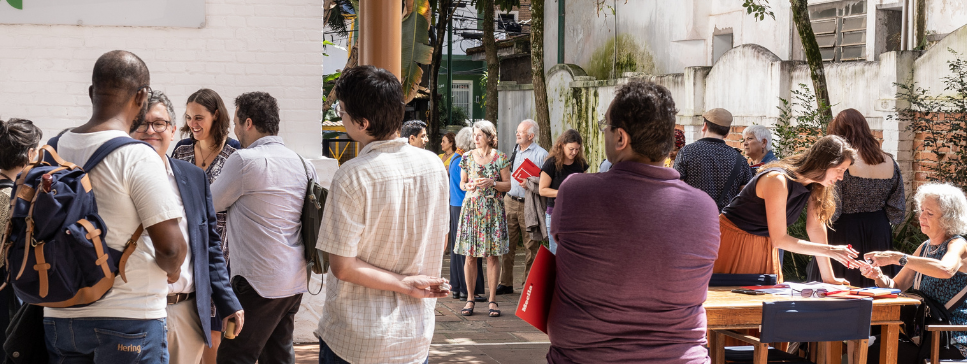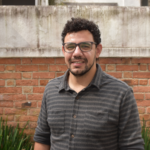

Climate Crisis, Just Transitions, and Narratives of Conviviality-Inequality
Marco Antonio Teixeira holds a PhD in sociology from the Institute of Social and Political Studies (IESP) at the Universidade do Estado do Rio de Janeiro. He was a postdoctoral researcher at Heidelberg University (2023–2025) and previously at FU Berlin (2019–2023). With over fifteen years of experience working in academia, the public and private sectors, social movements, NGOs, and international organisations, he has developed expertise in social movements, food systems, socio-environmental and climate justice, social inequalities, just transitions, and intersectionality. He received the Maria de Nazareth Baudel Wanderley Award for the best doctoral thesis by the Brazilian Rural Studies Network in 2021. His work focuses on driving transformative change to address pressing socio-environmental and economic challenges, with particular emphasis on reducing inequalities and promoting social justice.
Abstract:
This research investigates narratives of just transitions among activists at the simultaneous events of the People’s Summit and COP30 in Belém, Brazil, by exploring how diverse agents negotiate convivial configurations within the climate crisis. Focusing on the unique territoriality of Belém – a city in the heart of the Amazon – the study examines how the local context shapes activists’ perspectives. Through participant observation, in-depth interviews, document analysis, and a participatory workshop, the research uncovers alternative just transition narratives from activists who are often marginalised by dominant discourses. By analysing interactions between activists and institutional norms, the project contributes to scientific and political debates on just transitions, highlighting the transformative potential of grassroots perspectives in reimagining convivial futures in the context of the climate crisis.

The Invisible Spaces of Citizenship: Transnational Belonging through Music
Caio da Silveira Fernandes holds a Ph.D. in Geography from the Universidade Federal do Rio de Janeiro (UFRJ) and an MA in Geography from the Universidade Federal do Paraná (UFPR). He was a Fulbright fellow at the University of Kentucky during his doctoral studies, and is currently a postdoctoral researcher at CEBRAP’s International Postdoctoral Program (IPP), as well as associated researcher of the research cluster Mobilidades, Teorias, Temas e Métodos (MTTM) at USP. His primary research area consists of ethnographic approaches to migration, citizenship, and inequalities in urban spaces .
Abstract:
This project focuses on the intersection of art, migration, and citizenship in São Paulo. It aims to identify and analyze invisible spaces that play a significant role in the reimagining of citizenship, but are overshadowed by the formal aspects of Politics. The conventional understanding of citizenship is the affiliation of an individual to a Nation State; nationality is central to guarantee their rights and create belonging. Consequently, what does not fit in this logic turns invisible, including those of other nationalities and spaces that go beyond State institutions. This project considers how art can question order, on the one hand, and how it can produce new orders, on the other. To this end, I invert the conventional order of citizenship by highlighting Guinea Conakry musicians who live in Sao Paulo and mediate the city’s convivialities-inequalities through African dance and percussion. The project involves following the everyday trajectories of four African migrants; carrying out in-depth interviews with them; and organizing three dance and percussion workshops in different locations within the city.
18.11 | Workshop de dança e percussão de Guiné Conacri – África

Jasmin Immonen is a social anthropologist. Her research fields are youth, schooling, and urban land policies in neoliberal Peru. As both researcher and activist, her current interests are feminist and decolonial approaches to the climate crisis and climate precarity, as well as new concepts of well-being and governance for the global North (or the Minority World).
Abstract:
The project “Connections” explores how art, bodily, and alternative methodologies are used to draw connections between feminism, Nature, and diaspora. The project uses art as a tool to reduce power disparities through its ability to deconstruct, to tell another story and to cure. The project works with the themes of sentipensar through art to create a connection with the audience. Latin American and global artists are invited to São Paulo to deliver a workshop and carry out interventions, ranging from dance performances to visual art, in order to connect with other people and disrupt mundane life. In this way, art becomes a tool to unite and explore oneself, rather than an object for consumption. These explorations aim to invert subject-object relations, emphasizing interconnectedness, rather than separation.
17.08 | CORPO MIGRANTE – um corpo ressonante
18.09 | Corpas que voam: conexões São Paulo
